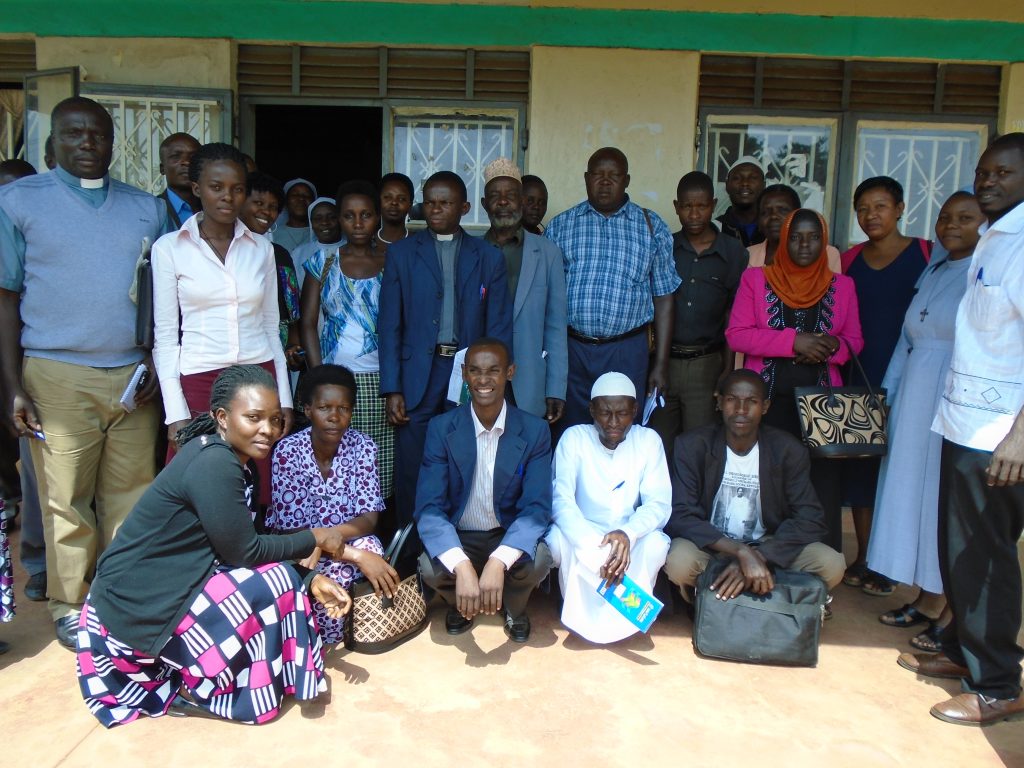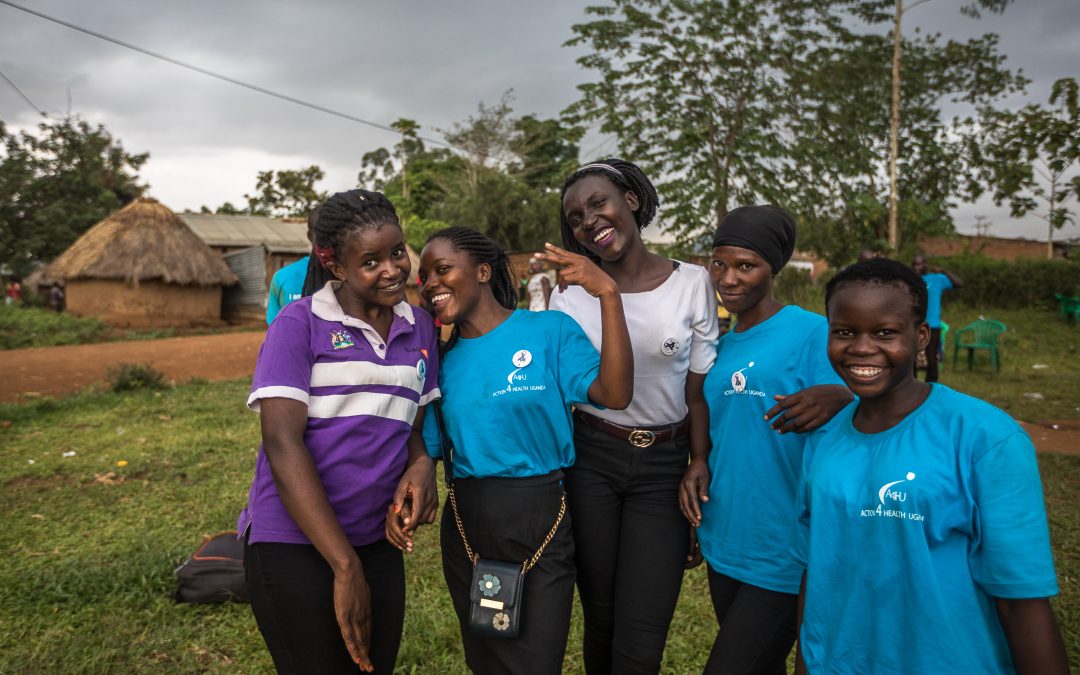Documentation of Case Studies for Advocacy/Campaign Work of SoAWC Partners
The Western Uganda Faith-Based Organisations Network (WUFBON)
Combating the COVID-19 Pandemic with the Ruwenzori Interfaith and Media COVID-19 + SRHR Task Force
September 28, 2020
Documented by Julie Tumbo, Rhonda Schlangen and Moses Atuhaire
Africa has many civil society organisations that serve their communities, including women, who, despite their pivotal role in community and family well-being, are often marginalised and under-prioritised. The State of the African Woman Campaign (SoAWC) was designed to support these organizations to apply their nascent knowledge about the needs and well-being of women to advocacy for change.
This case study tells the story of how one faith-based organisation used its enhanced internal advocacy capacity and reinforced organisational systems to successfully mobilise resources and launch an emergency multi-stakeholder community response to COVID-19 in Western Uganda.
Western Uganda Faith-Based Organisations Network (WUFBON)
The Western Uganda Faith-Based Organisations Network (WUFBON) is an umbrella network made of 86 faith-based organisations (FBOs) and civil society organizations (CSOs) as well as more than 800 religious champions. It was established in 2014 to complement government programs that are aimed to improve the well-being of people in Western Uganda. WUFBON uses a faith-based lens to focus on poverty eradication, human rights, respect and social cohesion.
Engagement of WUFBON in the SoAWC Project
From 2018 to 2020, WUFBON benefited from advocacy capacity support from the State of the African Women Campaign (SoAWC) as a member of the Faith to Action Network (F2A). These included workshops and coaching concerning women’s rights and how to plan and undertake advocacy. WUFBON also learned with other religious leaders through convening and exchange visits that exposed them to the innovations and advocacy tactics being applied in different communities in Uganda. These provided opportunities to debate and develop a shared policy position on issues affecting women.
For WUFBON, these experiences prompted changes in their organisation’s prioritisation of practices and systems that, in turn, support advocacy. WUFBON reported that its governance strengthened and its leadership improved, making a smooth transition to the new current governing board. It also improved its project management and internal relations with its members and international donors. These changes enabled WUFBON to secure more resources for operations and advocacy work and hire more qualified staff to implement various projects.
The government, donors and community members have increasingly recognised WUFBON as a leader in safeguarding human rights, health and gender equality in the communities where it works. In turn, WUFBON has stepped into its leadership and coordinating role. It led a group of FBOs to influence the creation or amendment of various policies, plans and programs related to COVID-19 and family planning in Western Uganda, including efforts to respond to the pandemic.
The Problem Addressed by the Case Study
Uganda reported its first case of COVID-19 in March 2020. The country soon put in place public health regulations aimed at curbing the spread of the virus. These regulations restricted citizens to their homes and banned public gatherings, meetings and activities; limited movement in and out of the country; and temporarily suspended some government activities such as court hearings. These restrictions helped combat the spread of COVID-19, but they also made women increasingly vulnerable to human rights violations within their households and communities. As COVID-19 continued to claim lives globally, public resources were diverted as well, leading to disruptions to supplies of contraception and other essential reproductive health commodities.
WUFBON reported that, due to COVID-19, women and girls have endured increased abuse, violence and exploitation of all types. Mental health challenges became prevalent among women and girls. Women also suffered limited access to critical family planning and other health services. COVID-19 conditions also enhanced their economic vulnerability through loss of employment or financial resources.
The urgent need to prioritise COVID-19, which appeared quite unexpectedly and had the potential to spread in the country rapidly, was clear. WUFBON nimbly responded by mobilising various stakeholders to re-think their roles and urgently respond, and by convening an initiative that was dubbed ‘Building community and health system resilience during the COVID-19 pandemic through Ruwenzori interfaith and media COVID-19 + SRHR taskforce’.
‘WUFBON is taking on this challenge the best way we know how: by putting women and girls at the centre of everything we do and with an unyielding dedication to building resilient health systems and communities.’ Moses Atuhaire, WUFBON

Members of WUFBON gather for a group photo.
WUFBON’s Response to COVID-19
Participating in advocacy capacity strengthening through SoAWC and with other partners equipped WUFBON to quickly adapt and handle unforeseen emergencies. In addition, WUFBON received financial support from Preston Werner Ventures (PWV), Population Action International (PAI) and others. Therefore, despite the unforeseen emergence of the COVID-19 pandemic, WUFBON reported that its activities continued with the usual momentum. To date, WUFBON has been focussed on building community and health system resilience through its taskforce. WUFBON and its partners advocate for addressing the needs of women in Uganda’s COVID-19 response. Examples of their achievements are:
- Advocated for increased COVID-19 funding and tracked how resources for COVID-19 were allocated and used. This information was then shared with the media, religious leaders, CSOs, donors and the government, enhancing the pandemic oversight and coordination efforts.
- Collaborating with the government to strengthen health systems and ensure that essential health services continue to be available to women and girls. Specifically, WUFBON provided technical inputs and supported the development of the district COVID-19 response and a recovery plan for Kyenjojo District, which also integrated family planning issues and needs.
- Used public education communications to help prevent the spread of COVID-19 and unintended pregnancies. WUFBON developed and conveyed information on COVID-19 through weekly outreach truck drives to meet communities, radio sessions hosted by three media houses, and print materials like the quarterly district health bulletins.
- As a network, WUFBON also mobilised resources which it re-granted to enable local community-based organisations to combat the spread of COVID-19 and unintended pregnancies. For instance, grants ranging from $500 to $1,000 were made by WUFBON to groups of lesbian, gay, bisexual, transgender, queer and intersex (LGBTQI+) persons who had experienced homophobic and transphobic violence and barriers to access health care, food and shelter.
- Developed the strategy for implementation of sexual and reproductive health activities in the context of COVID-19 to ensure continuity of services to the LGBTQI+ community. This included collecting data about the impact of COVID-19 on LGBTQI+ persons, advocating for emergency relief services for LGBTQI+ persons and launching helpline interviews featuring the challenges LGBTQI+ persons face due to COVID-19.
- Through all of this, WUFBON took active steps to keep staff safe from exposure to COVID-19, including by practicing social distancing; hygiene; use of face masks and protective gear; and provision of general information, counselling and education services.
‘WUFBON’s targeted response helped vulnerable women, girls and their communities not only survive this crisis but come through it stronger and more resilient.’ WUFBON
Lessons Learnt from the COVID-19 Response
WUFBON shared the main lesson of this effort to ensure the needs of women and LGBTQI+ people are addressed in combatting COVID-19: to maintain focus on core priorities and adapt to the demands of the situation. As a WUFBON staff member described in a written response to a survey question about their experience with COVID-19:
‘During a public health crisis like COVID-19, without innovative solutions and intensified support to health systems that focus on the frontline health workers, the majority of whom are women, we will continue to see a rise in gender-based violence, unintended pregnancies and maternal deaths, as well as a decrease in economic opportunities for women and girls.
Factors That Helped WUFBON Succeed in Continuing Activities and Efforts to Combat COVID-19
WUFBON noted various factors that helped it to succeed in promptly responding to the COVID-19 pandemic. Their work with SoAWC partners coupled with capacity strengthening from F2A helped reinforce learning about how to launch efforts to protect women’s rights. WUFBON’s strong internal systems and processes enabled it to adapt to the demands of the times.
At its core were the invaluable resources of people. WUFBON members quickly pooled various human, financial and material resources required for the work. The highly qualified and dedicated WUFBON staff risked their lives to educate communities in the face of the pandemic. These experiences were enabled and reinforced by the credibility, respect and support that WUFBON commands as a defender of the rights of vulnerable persons.
Future Plans and Recommendations
WUFBON recommends that, in future, small grants should be provided to enable SoAWC partners to go the extra mile beyond capacity building and be able to implement innovative ideas to advance human rights for women and girls in Africa.
Featured image by Brian Otieno for DSW.

